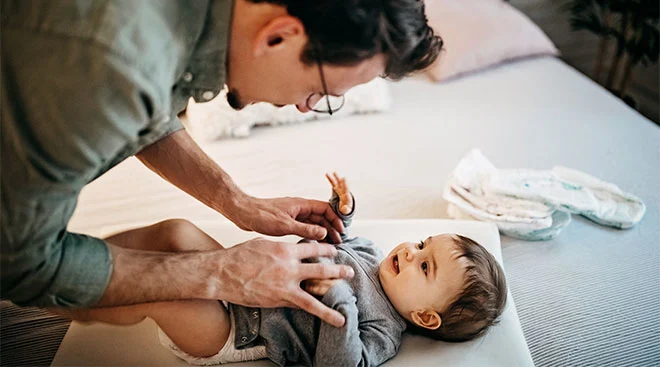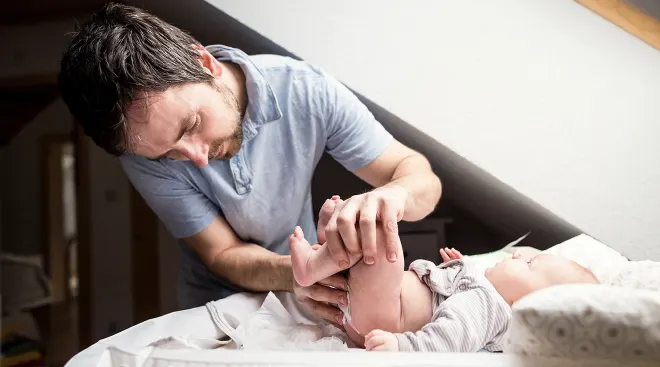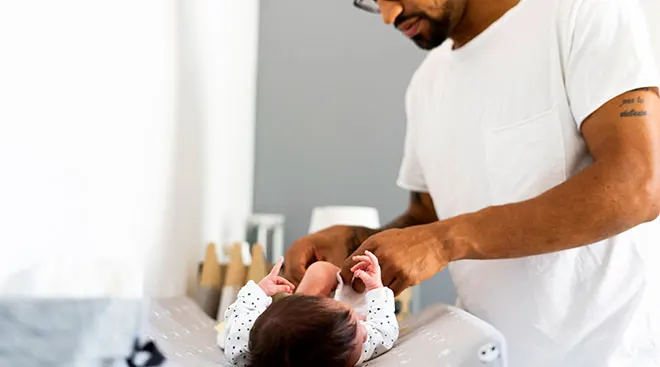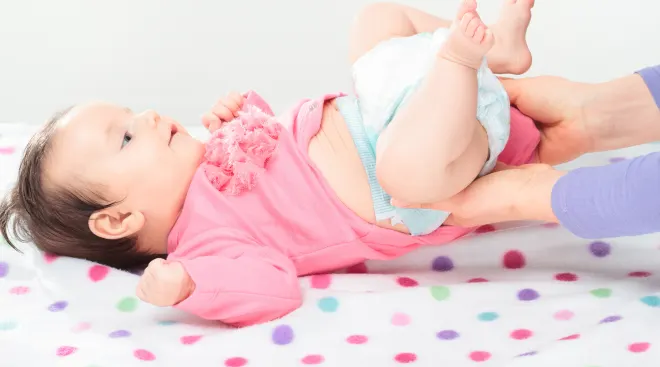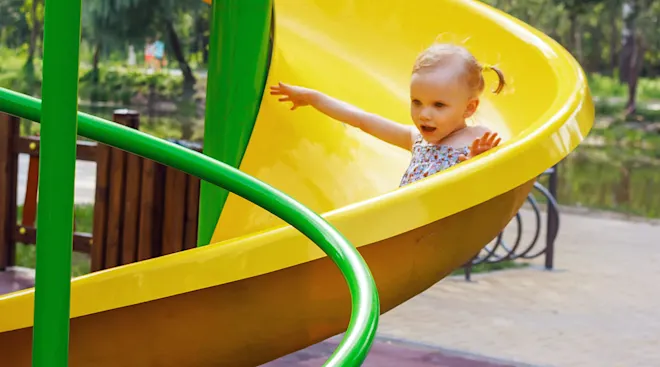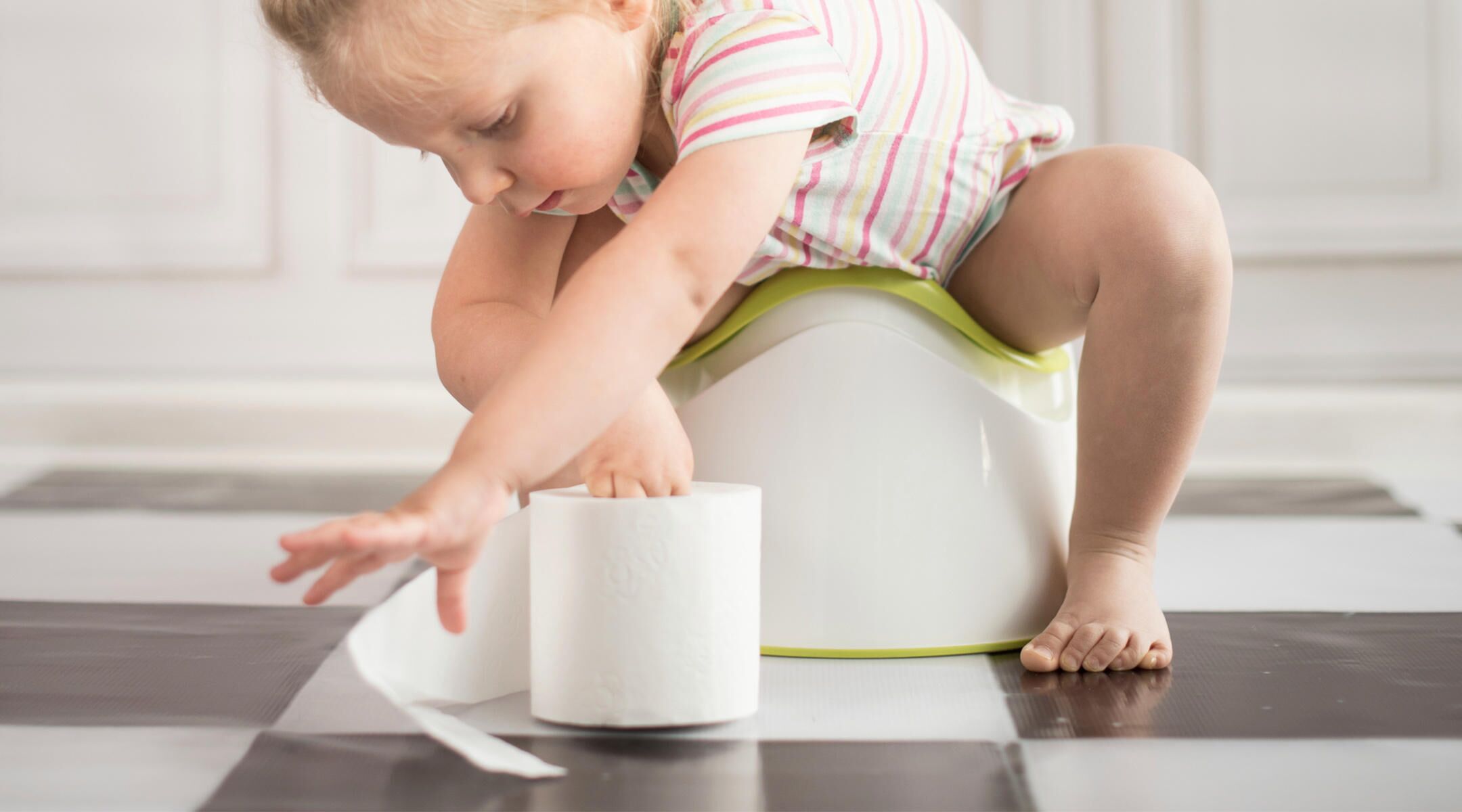Baby Diarrhea vs. Normal Poop: What It Looks Like and How to Treat It
It’s true that baby poop can vary in color and consistency—and that these descriptors can change with age, stage and diet. Being on perpetual poop-check duty can feel like an ongoing biology lesson, but with an impressive number of diaper changes under your parenting belt, you probably have some idea of what your little one’s regular poops are like. So when that nappy load suddenly looks different, it’s only natural to wonder if baby has diarrhea.
Yes, newborn and baby diarrhea happens—and just like with adults, there’s a range of what to expect and what it can mean. Ready to get the rundown on the runs? Here’s what you need to know about baby diarrhea, how to stop it and when to check in with your pediatrician.
Under normal circumstances, baby poop looks different than adult poop.”Baby bowel movements are soft and mushy at baseline, so parents often wonder if it’s diarrhea,” says Katie Lockwood, MD, a pediatrician at Children’s Hospital of Philadelphia.
That said, baby’s regular poops also vary depending on whether they’re breastfed or formula-fed, says Danelle Fisher, MD, a pediatrician and chair of pediatrics at Providence Saint John’s Health Center in Santa Monica, California. “When babies are taking formula, their normal stools tend to have a little more texture to it,” she notes. “A breastfed baby’s poop is usually watery and a little yellowish.” This can make it even more challenging to distinguish breastfed baby diarrhea from their loose but normal poops. (The fact that breastfed babies can poop multiple times a day adds an extra layer of confusion to the already muddy picture.)
Still, regardless of whether your infant is breastfed or formula-fed, baby diarrhea is usually “a significant change from whatever their baseline is,” Lockwood says. A big tip-off that baby has diarrhea is when they’re suddenly going more than usual and it looks “very loose and watery,” says Lana Gagin, MD, a pediatrician at Helen DeVos Children’s Hospital.
Everyone poops—and unfortunately, we all get an occasional bout of the runs (babies included). This can happen for any number of reasons. These are among the most common possible causes of diarrhea in babies:
-
Viruses. Is your little one sick with a bug? Viruses are one of the “most common reasons for acute diarrhea in infants,” Gagin says.
-
Bacteria. While viruses are the more likely culprit, “occasionally babies can get a bacterial infection that causes diarrhea,” Lockwood says. These infections include salmonella, staphylococcus and shigella.
-
Food allergy. Ever eat something that just sets you off? “Sometimes what we’re feeding baby could cause diarrhea,” Fisher says. What’s more, a food allergy or lactose intolerance could be at play.
-
Formula. It’s important to follow the instructions when mixing baby’s formula. If it’s not done correctly, it can lead to a case of diarrhea, warns Fisher.
-
Antibiotics. Has your little one recently taken medication? “Some babies can get diarrhea after being on antibiotics,” Lockwood says. There are some other potential causes of baby diarrhea too, according to the Mayo Clinic: Celiac disease, characterized by a reaction to gluten, can be difficult to diagnose in infants but is often marked by regular diarrhea. Chronic inflammation of the digestive tract could also contribute to frequent, loose stools. And, in rare instances, conditions such as neuroendocrine tumors or Cystic fibrosis can cause recurring diarrhea.
Can babies get diarrhea from teething?
It’s easy to assume that teething can be a cause of diarrhea if the two events just so happen to occur at the same time. But doctors say there isn’t really an established link between the two. “Parents anecdotally report symptoms related to teething, such as loose stools, but this shouldn’t be true diarrhea,” Lockwood says. “The thought is that the increased saliva related to teething is swallowed and makes the stools looser.”
If baby just has a short course of diarrhea (meaning a day or two), they may not have any undesirable side effects. But if the diarrhea goes on for longer or is more severe, baby may also experience the following:
-
Dehydration. “Diarrhea can be a risk factor for dehydration,” warns Lockwood. To that end, she stresses that it’s important to ensure that baby is able to keep up with their hydration needs during bouts of diarrhea.
-
Diaper rash. All that super-loose or liquid stool can irritate baby’s delicate skin down there, leading to a painful diaper rash. “You can try to prevent this by applying a diaper cream with each diaper change,” Lockwood suggests.
-
Weight loss. “If diarrhea is excessive or prolonged, babies can lose weight,” Lockwood says. If weight gain is already an issue for your little one, talk to your pediatrician about ways to help them catch up once the diarrhea stops.
No parent wants to see their baby in discomfort, and diarrhea isn’t always the most pleasant—as you probably well know. You can’t necessarily stop baby diarrhea, but you can take some steps to help baby get relief. Try these tips to slow the flow:
-
Focus on hydration. If you’ve been nursing, Fisher recommends continuing to do so. “Breast milk is the best thing to hydrate a baby,” she says. If your child takes formula, your pediatrician may recommend trying something with electrolytes, like Pedialyte, to help enhance hydration. (Don’t give a baby younger than 6 months old any water or Pedialyte without consulting their doctor.)
-
Avoid high-sugar foods. While babies can have any foods they normally eat, Lockwood suggests steering clear of too much sugar or juices.
-
Consider probiotics. Probiotics might help, but Lockwood suggests talking to your child’s pediatrician before giving them any supplement, drops or so-called baby diarrhea remedy.
Some pediatricians may recommend the BRAT (bananas, rice, applesauce and toast) diet for a baby who eats solids, but the American Academy of Pediatrics now advises against it. It could potentially help solidify stools, but it may be more likely to exacerbate the issue. What’s more, the limited food options lack the nutrition a baby needs to help with recovery of the gastrointestinal tract.
And while you may reach for anti-diarrhea medication when you get the runs, it’s unfortunately not an option for baby. There are no over-the-counter baby diarrhea medicines recommended for babies and children younger than 2, Gagin says.
Don’t hesitate to contact your pediatrician if you have any concerns about baby’s health and well-being. That said, Gagin emphasizes that there are a few compelling red flags that warrant an immediate call to the doctor. If your little one experiences any of the following symptoms, be sure to reach out right away:
- Baby seems dehydrated—that means fewer wet diapers, fewer tears when crying, a dry mouth, a sunken soft spot and/or less activity than usual
- There’s blood in baby’s poop
- Baby will not drink
- Diarrhea is accompanied by fever and vomiting that lasts more than 24 hours
- Baby appears to be in pain
- Baby’s abdomen looks full
- Baby’s skin looks yellow
- The diarrhea lasts for more than two days and doesn’t seem to be improving
Yellow, watery diarrhea in babies is usually no big deal. It’s messy, but so is this whole parenting gig. Do what you can to help your little one feel more comfortable, and continue to monitor the situation to make sure they’re staying hydrated. And if they’re experiencing any other troubling symptoms, call your doctor. In the meantime, keep the wipes and the diaper cream handy. You’ve got this.
Please note: The Bump and the materials and information it contains are not intended to, and do not constitute, medical or other health advice or diagnosis and should not be used as such. You should always consult with a qualified physician or health professional about your specific circumstances.
Plus, more from The Bump:
Danelle Fisher, MD, is a pediatrician and chair of pediatrics at Providence Saint John’s Health Center in Santa Monica, California. She received her medical degree from Albert Einstein College of Medicine of Yeshiva University in New York.
Lana Gagin, MD, MPH, IBCLC, is a pediatrician at Helen DeVos Children’s Hospital in Grand Rapids, Michigan. She earned her medical degree from State Bashkir Medical Institute in Ufa, Russia.
Katie Lockwood, MD, is a pediatrician at Children’s Hospital of Philadelphia. She received her medical degree from Jefferson Medical College in Philadelphia, Pennsylvania.
Healthy Children (American Academy of Pediatrics), Diarrhea in Children: What Parents Need to Know, May 2021
Learn how we ensure the accuracy of our content through our editorial and medical review process.
Navigate forward to interact with the calendar and select a date. Press the question mark key to get the keyboard shortcuts for changing dates.
































